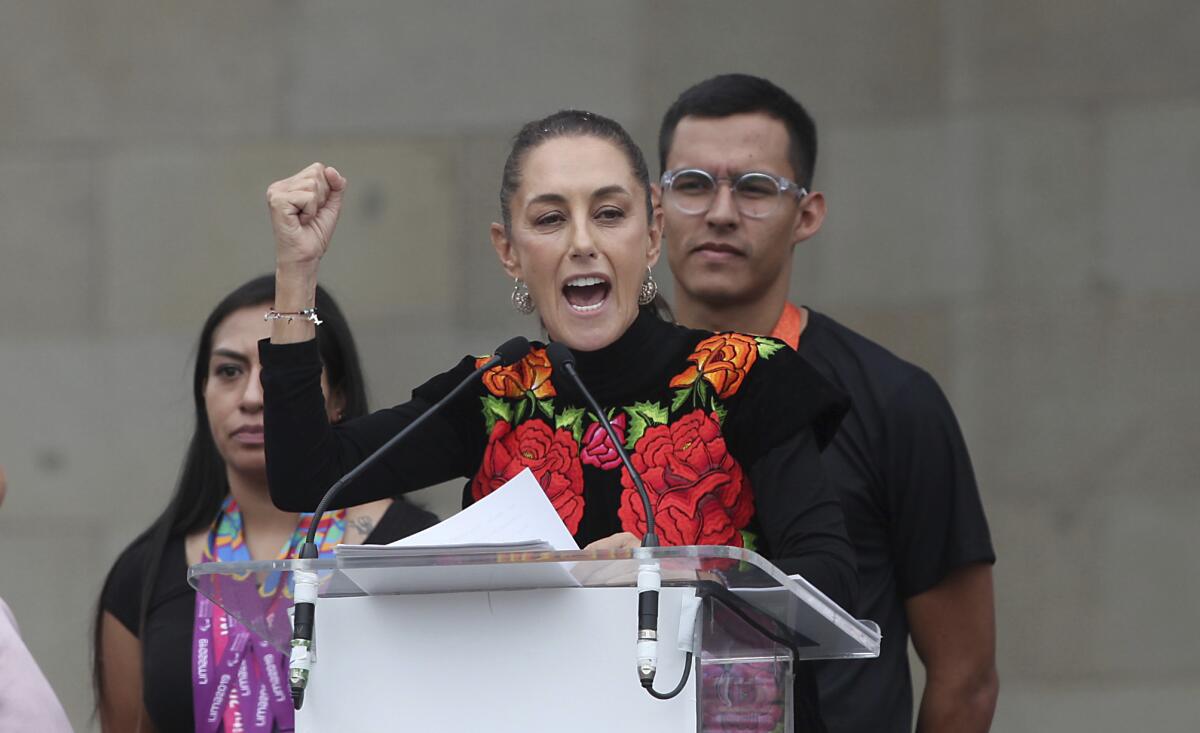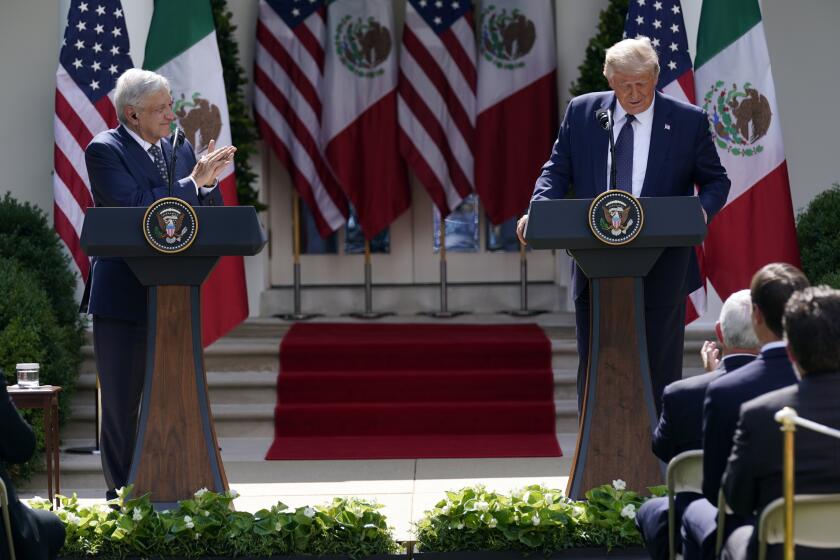Mexico making history: The country is on track to elect its first woman as president

- Share via
MEXICO CITY — Mexico’s ruling party on Wednesday named former Mexico City Mayor Claudia Sheinbaum as its candidate in next year’s presidential race, a widely expected move that puts the country on track to elect its first female president.
The major opposition coalition had already chosen another woman, Xóchitl Gálvez, a sitting senator in the Mexican Congress, as its standard-bearer.
The two women — Sheinbaum, 61, a physicist and former university professor, and Gálvez, 60, a successful tech entrepreneur — are set to face off in an election scheduled for June 2.
The nomination Wednesday was largely overshadowed by a blowup inside the ruling party, known as Morena. Sheinbaum’s chief competitor, Marcelo Ebrard, cited unspecified “faults” in the primary process even before final results were announced.
Ebrard, a former foreign minister, called publicly for a rerun of the internal polling that ultimately gave Sheinbaum her victory.
He alleged that his campaign representative was beaten by police when she attempted to enter the site in downtown Mexico City where ballots were being counted. “I never thought I would live [to see] something like this in my own party,” Ebrard wrote on X, the platform formerly known as Twitter.
Gálvez, the opposition candidate, mocked the turmoil, inviting Ebrard to join her movement.
Mexico City Mayor Claudia Sheinbaum aims to succeed President Andrés Manuel López Obrador, and shares his policies, ideology and even speech patterns.
Officials of the ruling party disputed Ebrard’s charges and said there would be no new polling.
Sheinbaum won an average of 39.4% of the votes in five internal polls, Morena said. Ebrard was second, with 25.8%. The former foreign minister was the only one of the six Morena candidates who did not show up for the unveiling of the results.
Ebrard’s allegations exposed deep rifts in Morena, the political behemoth that was founded by President Andrés Manuel López Obrador and now towers above the Mexican political landscape. The party and its allies hold a majority in Congress, and Morena governs in 21 of the country’s 31 states as well as Mexico City, the capital.
Even before Wednesday, Ebrard had publicly questioned whether the Morena primary process was fair. However, he was widely expected to accept defeat and sign on for a Cabinet post next year in the case of a Sheinbaum win next year. After Wednesday’s events, rumors were circulating that Ebrard might now enter the presidential race as a third-party candidate.
López Obrador dictated the terms of Morena’s primary race, ruling out debates as divisive. He repeatedly denied rigging the primary process in favor of Sheinbaum, his longtime protege.
“I haven’t tilted the balance,” the president told reporters Tuesday. “The dedazo is finished,” he added, referring to the historical practice in which sitting Mexican presidents used their “big finger” to point to their successor.
The triumph of Sheinbaum was no surprise. For months, she had maintained a lead of 10 points or so in polling against Ebrard, who served as chief diplomat in the López Obrador government before resigning to run for president.
Sheinbaum is heavily favored to win next year’s election in large part because of her close association with López Obrador, 69. The president is extremely popular — boasting 60% approval ratings, largely because of his appeal among poor and working-class voters — but is also a divisive figure. Critics accuse him of leading the country down a path of authoritarian rule. The president rejects the charge, accusing rich, right-wing adversaries of trying to discredit him because of his fight against corruption and dedication to the poor.
For Mexican President Andrés Manuel López Obrador, appearing to stand up to the United States has proved to have political benefits at home.
Sheinbaum shares the president’s leftist ideology and frequently extols him. At times, she even seems to mimic her mentor’s speech patterns.
López Obrador is to complete his six-year term on Sept. 30, 2024. Mexican law bars presidential reelection. The president says he plans to retire.
Next year’s election is widely viewed as a test of whether López Obrador has built a long-term movement that maintains its dominance even after its charismatic leader steps down from power.
Mexico election: The two women frontrunners in the race for president both invoke gender and a cracking glass ceiling. So why are some feminists skeptical?
If elected, Sheinbaum would also be Mexico’s first president of Jewish ancestry. Her maternal and paternal grandparents emigrated to Mexico from Eastern Europe.
Sheinbaum, a Mexico City native, comes from a tradition of political engagement since her high school days, when she protested against the exclusion of students, many of them poor, from higher education.
She spent four years at the Lawrence Berkeley National Laboratory in California on her way to earning a doctorate in energy engineering. She was teaching at her alma mater, the National Autonomous University of Mexico, in 2000, when López Obrador — then the mayor of Mexico City — offered her the post of secretary of environment for the capital. That appointment launched a meteoric political rise.
The strong prospect of a female chief of state in Mexico comes after years of political gains for women. A woman currently heads the Supreme Court and women sit as governors in eight of Mexico’s 31 states. In 2022, women accounted for 25% of the country’s mayors.
Special correspondent Cecilia Sánchez Vidal contributed to this report.
More to Read
Sign up for Essential California
The most important California stories and recommendations in your inbox every morning.
You may occasionally receive promotional content from the Los Angeles Times.















